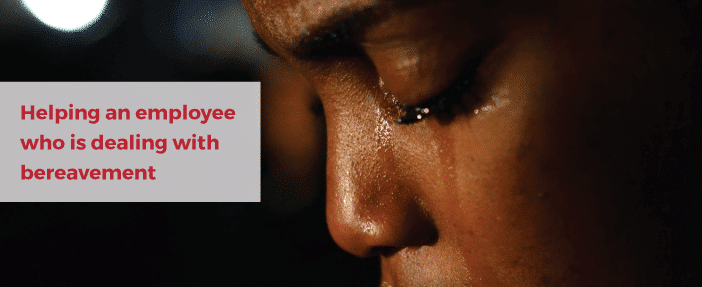Helping employees deal with loss
Losing a loved one is a fact of life. Dealing with this loss is what varies from one person to another. While your company may have a program that helps employees dealing with bereavement to settle back at work comfortably, it is important to also ensure that you help them in the process. Good policies are not enough to help a grieving person.
A person who is dealing with a personal loss is bound to have moments of sadness and this can greatly affect productivity. Managers and employees can help the bereaved employee deal with their grief and make the process of recovery less painful.
As a line manager or HR, you can support a person who is dealing with bereavement.
Create an environment where an employee can express grief

The grieving process takes time. Therefore, to help an employee dealing with bereavement, it is prudent to provide a safe working environment where the employee can freely express their emotions. Stifling of emotions prolongs the mourning period and process and can result in an emotional breakdown.
As an HR manager or line manager, it is good to create an environment where individuals can express their emotions either by crying or speaking about it. This tends to be a therapeutic process as one has an outlet for their emotions.
Understand the stages of grieving

There are five mains stages of grieving and they include denial, anger, bargaining, depression, and acceptance. Each person grieves differently and takes different lengths of time to overcome the sadness.
As a line manager or HR manager, it is important to understand the stages of grief so that you can be able to observe the bereaved employee and understand what they are going through. This way, you can adequately comprehend what a person is going through and respond appropriately as well as help other employees understand the bereaved employee.
Recognise hidden signs of grief

As much as some employees will come back to work and seem normal and happy, all may not necessarily be well. A person may have a fairly normal demeanour but that does not mean that they are not struggling with various emotions below the surface.
Mourning takes time and it can have a heavy psychological impact on the person dealing with bereavement. To help an employee overcome the emotional burden, an HR manager can make arrangements for specialised support or create room for confidential conversations through which the person can express their distress.
Give the person time and opportunity to mourn
Recognise that you are dealing with adults who can make their own decisions. Therefore, give the employee time to choose how long they would like to take before resuming work. This way, you show compassion and give them the time and space required to overcome the pain.
Additionally, it would be thoughtful to ask the affected employee how they would like to be treated as they mourn. Do they want to talk about it regularly? Do they want to be treated normally and only be allowed to bring up the subject if they wish to? By giving them options, you demonstrate that you recognise their pain and you respect their privacy. This information should then be communicated to other members of staff as they are instrumental in the recovery process.
Understand the role of work in the recovery process

For some people, work provides a semblance of normalcy and a good distraction to the pain they are experiencing. As a result, some people dive back to work immediately and get engrossed in their work. However, this does not mean that they have overcome the pain. Rather, it is just a coping mechanism and managers ought to understand that the person’s performance may not be optimal during this period.
It is the work of the line manager or HR manager to provide a flexible working schedule and provide any required support during this period to ensure that work is more of a relief, rather than a burden. In order to make the process of returning to work smoother, work can be redistributed so that it does not strain the person but still offers a good coping mechanism.
Role of policies and procedures

The process of mourning is stressful and strenuous to the person who has lost a loved one. As such, certain policies and procedures such as compassionate leave, insurance benefits, condolence gifts, and leave sharing help to make the process somewhat bearable. It is the responsibility of the HR manager to ensure that these policies and procedures are in place and are simple to follow. Moreover, the HR manager can help by coordinating the help given by colleagues just to make the process organised and cause less stress to the bereaved colleague.
In the same breath, it is good to also organise how a number of colleagues can attend the funeral, just to give the necessary moral support. People feel better when they are physically and emotionally supported when dealing with bereavement.
Provide counselling

Where possible, the line manager or HR manager can provide support by bringing in a professional counsellor to help the employee. A professional counsellor has the right skills and can help the employee find a confidential space to express their sorrow.
Be patient

Finally, people cope with distress differently. As a result, it is important to ensure that you provide an environment that allows the employee to slowly and comfortably deal with the pain at their own pace. Do not expect the person to dive right back to work like it never happened. Do not give the person timelines to deal with the pain and most of all, acknowledge their physical, emotional and psychological changes. Even if you provide all the necessary support, there is no telling how long the process of healing will take.
Therefore, lower your expectations and those of your colleagues and allow the person to deal with their pain at their pace.
Dealing with bereavement can take an emotional and psychological toll on a person. During this time, it is important for the line and HR managers to offer as much support as possible. People deal with pain differently and recognising the stages of grief as well as providing a safe environment can go a long way in helping a person overcome their agony faster and smoothly.





